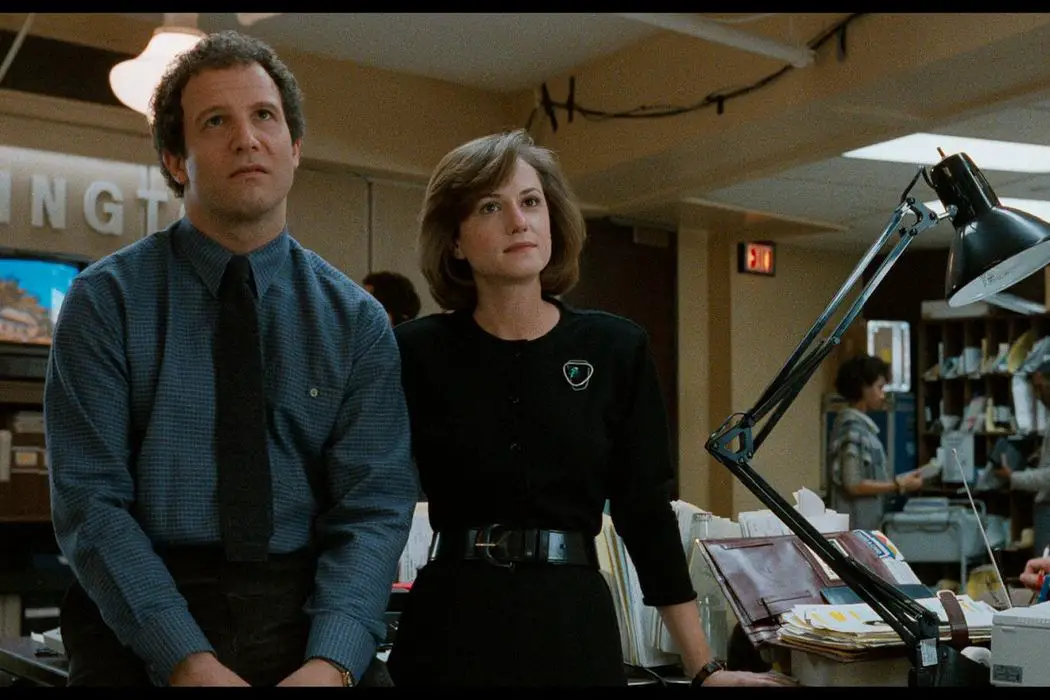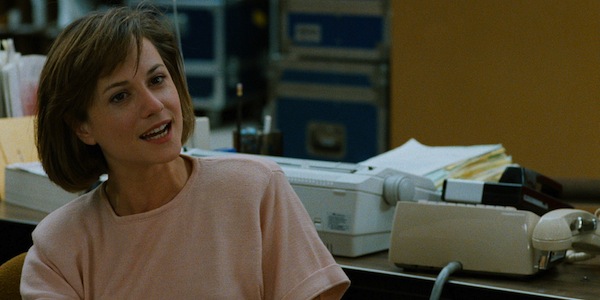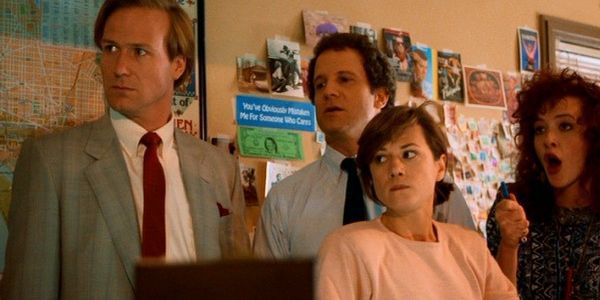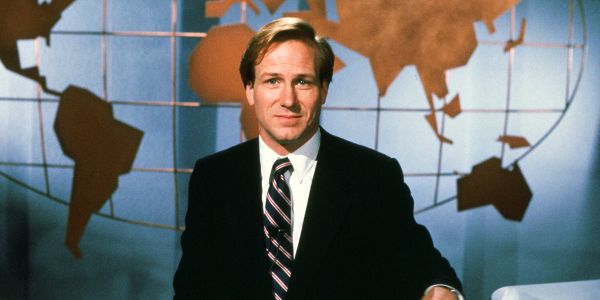30 Years Later: BROADCAST NEWS & Being The Smartest Person In The Room

Midwesterner, movie lover, cinnamon enthusiast.
“It must be nice to feel like you’re the smartest person in the room — to feel like you’re always right and everyone else is always wrong.”
“No, it’s awful.”
This exchange, between a TV station president and Jane Craig, the news producing protagonist of James L. Brooks’ 1987 film Broadcast News, is the film’s best, most oft-quoted moment. Jane’s response, in isolation, might sound like the self-pitying or arrogant woes of elitist ennui — unable to connect with people due to an irregularly high IQ. But it’s not. It’s the expression of someone who’s exhausted. Broadcast News, which turned 30 this past December, is about realizing that no matter how smart you are, or how hard you work to be a good person, sometimes the world just doesn’t care.
Early in the film, Jane (Holly Hunter, giving the performance of a lifetime) gives a speech at a broadcasting conference on the cautions of journalism’s gradual decline from hard-hitting news to star-driven infotainment. Her dry, nose-in-her-notes delivery yields snores from the audience, most of whom aren’t fundamentally opposed to the idea of an entertainment-based approach to news content. When she shows an example of a silly video being passed off as news coverage, they laugh in unison, leaving her visibly distressed. Her colleagues fail to understand what she considers basic journalistic integrity.
Jane, whom Brooks fashioned after multi-Emmy winning TV news producer Susan Zirinsky, is the type of person that tells the cab driver — someone who professionally drives around Washington, D.C. — the best route to take. Her intellect doesn’t take a break — whether it’s producing a primetime news piece or telling a colleague where a file is located. In his review for The Washington Post, Hal Hinson explained her as such, “Jane is a bantam-size producer from Atlanta who zips through the day as if she had pure caffeine pumping through her veins. Jane’s brain has only two speeds: fast and extremely fast. She’s always in gear.” Jane constantly cares; she’s meticulously detailed and mercilessly bound to her ethics and instincts.

“A New Kind of Woman”
Multiple times, Jane is seen in private, unplugging her phone and weeping. There’s never really an antecedent for it; it feels more like a meditation than a direct response to anything. Though it wouldn’t have been referred to as such in 1987, Jane’s fits of sobbing feels like the byproduct of her immense emotional labor. It’s an intimate look at her personal life, her expression of vulnerability. And Brooks is right to simply observe it, letting it be a vague moment of catharsis. In a 2011 interview with The Atlantic, Brooks said these moments came out of his research for the character, “The third time you hear something, you can start to think that it’s generally true. Three or four times, different women told me that in the course of a day, they cried. It wasn’t that they were crying in a programmed way, it was just a release.”
We first meet Jane as child, in the film’s odd, Norman Rockwellian prologue. She’s comically scolding her dad for calling her “obsessed,” asking that he be more precise with his words. The film then dissolves to modern day, where Jane stops mid-speed walk to pick up an issue from all six newspaper vending machines. While her zealousness is observed as comical, Brooks knows the difference between comedic dedication and obsessiveness. The character is given the freedom to be really good at her job without it being judged as overcommitment or pathologized as obsessive.
“Obsession,” as a character trait is thrown around quite a bit, especially in relation to the prestige work of contemporary American male auteurs, like David Fincher, Christopher Nolan, Paul Thomas Anderson, Alejandro González Iñárritu or Darren Aronofsky. These are films about men driven by their passion, willing to traverse any plane or moral compromise to fulfill their self-prescribed destiny. We’re constantly being asked to concurrently witness their destruction and empathize with their redemption. There seems to be an endlessly unsaturated demand for these quixotically dark flights of fancy.
When we get films about women’s obsessions, they tend to invariably perpetuate the “psycho bitch” stereotype. And when we get a film about a career woman, more often than not, that’s shorthand for “overworked and undersexed.” Hollywood’s imagination of an extremely passionate and driven women is quite narrow and unflattering. Broadcast News provides us a wonderful antidote to both the masculine obsession narrative and the shallow representations of Hollywood’s professional woman. Jane isn’t psychotic; she’s not obsessive. Like many people, she’s just trying really hard to be good at what she cares about most.
“We’d come out of years of feminist pictures, and I wanted to catch a new kind of woman. I was on the lookout. That was my conscious goal,” Brooks told The Atlantic. Jane finds a large sense of fulfillment and identity in her career as a broadcast news producer, and Brooks understands how important that is. It might not make much of an elevator pitch or plot synopsis, but sometimes it’s remarkably refreshing to simply watch smart, rational, complex people be smart, rational and complex.

More than a Love Triangle
The framework for the film is the triangle formed between Jane, her best friend Aaron (a fellow journalist played by Albert Brooks) and their new coworker Tom (William Hurt), who has recently transitioned from sports news coverage. Romance, friendship and professional collaboration ebb and flow between the three. As Roger Ebert put it, Broadcast News “is about three people who toy with the idea of love, but are obsessed by the idea of making television.”
Aaron is charismatically neurotic. “Wouldn’t this be a great world if insecurity and desperation made us more attractive? If needy were a turn-on?” He and Jane connect over a mutual respect of journalistic ethics, hard work and a disdain for anything less. If Jane wasn’t around, Aaron would feel like the smartest person in the room, but he’s glad she is. At times, their relationship feels like a more realized version of the one explored at length two years later in When Harry Met Sally. They’re so kindred that Aaron often has trouble parsing unique friendship from sexual attraction.
Tom is the heartthrob. He enters the TV station and slowly disrupts their existing lives. Jane is confounded by him. “It’s hard to advise you since you personify everything that I hate,” she tells him early on when he asks to pick her brain. A mercurial rise to primetime news coverage, based solely on good looks, Tom epitomizes journalism’s moral atrophy. Yet, she’s intrigued — unsurprisingly, she’s increasingly intrigued the more Tom shows himself to be an asset, professionally. She’s torn between her attraction to Tom and her lack of respect for him.
“The movie never comes to being a great, penetrating work about television news. It’s not a scathing satire like Network, nor is it to broadcast journalism what All the President’s Men was to print,” Hinson said upon its release. Thank god. Those films are about news and television; Broadcast News is not. While some of the diegetic thoughts on TV journalism are progressive and prescient (wary of the rise of infotainment), broadcast news, as an arena for Brooks’ film, gives us a clear set of ethical boundaries in which to explore the central triad.

Moral Compass, News Anchor
Everything that happens in the film is part of a constellation that revolves around the film’s moral compass, and Jane and Aaron provide the defining parameters of that compass. Aaron sardonically calls out co-workers who praise the network’s capitalist ethos, brownnose executives or seek fame over honest reporting. He goes on and on about the systematic decay of standards, most notably calling Tom the devil, here to normalize this degradation of standards “bit by little bit” with his disarming personality.
There are two similar set pieces that delineate the dynamics of the film’s triangular relationship. The first is when Tom is given the chance at anchor over Aaron, who’s left to watch from home, while Jane produces. Unsolicited, Aaron provides Jane with useful segment filler for Tom to parrot. Tom gets to look good and sound smart on TV, Aaron is stuck at home, lonely and unsung, and Jane is in the middle, slowly growing more attracted to Tom.
The second is when Aaron is given a chance to anchor. The broadcast, which takes place the night Jane and Tom are on a date, is a disaster. Aaron can’t stop sweating profusely. It ruins his one shot at anchor. As a result, he’s faced with the realization that he can’t do what Tom does. Despite his lack of journalistic integrity and intellect, Tom has something to offer, both to broadcast news and to Jane, that Aaron doesn’t.
By the third act, Brooks has put his two pillars of morality up against their own beliefs. Jane falls for Tom, despite not respecting him, professionally. He is the epitome of what she was railing against in her conference speech — a star anchor uninterested in news. Meanwhile, Aaron has to face the fact that his hostility toward Tom isn’t just about his moral bankruptcy, but jealousy. Everything that Aaron has worked diligently to achieve is instantly handed to Tom. Aaron takes solace in his own intellect, as the thing that distinguishes him from the oafish Tom, but he knows intellectual superiority is no salve for loneliness or lack of recognition.
A massive layoff at the TV station separates the trio. Aaron is let go and Tom is promoted to a post in London, while Jane remains on staff. Before he has to leave for London, Tom invites Jane on a tropical getaway. The day before leaving, through the aid Aaron’s recon, Jane finds out about Tom’s “major breach of ethics” — when he spliced in a staged reaction shot of himself crying to the testimonial of a date rape survivor (his breakthrough piece of work). Jane meets Tom at the airport to scold him. But Tom’s more upset by the fact that she’s no longer joining him than the idea that she found out about his inauthentic journalism. In the face of her incredulity, he simply doesn’t care. He sees her ethical umbrage as a simple difference of opinion. He walks away without caring that he did something against the journalistic code, and she realizes there’s nothing she can do about it. He’ll face no recourse, only more promotions. She’s the smartest person in the room, but who cares? She goes back to her cab for a ride home. She stops herself from telling the cab driver what route to take. Maybe she knows better than him, but it doesn’t matter.
Brooks’ worldview isn’t necessarily bleak. He doesn’t suggest that Jane should stop trying so hard — certainly she finds a personal peace in her work and dedication — or should eschew her ethics for nihilism. But Tom’s professional success, and the rotting integrity of network news, have taught Jane that she can’t count on the rest of the world to care as much as she does. Brooks said the film is about “three people who lost their last shot at intimacy.” This is certainly most palpable through Jane’s trajectory. In the back of that cab, she sits back against the leather seat, defeated, as if she knows that was her last chance.
The beautiful paradox of Broadcast News is that while we’re given very distinct archetypes within the triangle (the anxious perfectionist, the neurotic and brainy loner and the handsome jock), none of them are ultimately restricted by their archetype. Tom throws a wrench in Jane and Aaron’s confirmation biases about pretty faces who fall into careers just as much as he confirms their suspicions. Through Tom’s entrance to the lives of Jane and Aaron, Brooks magnifies their inner conflicts. How much does being the smarter person matter if we’re not happy? Is it okay to soften our ethics if it means we can have intimacy? How important are our ethics if no one else cares about them? Broadcast News, more than anything, is a film about smart, morally adherent people who are forced to come to terms with their ideals and set of rationalizations. Jane and Aaron aren’t naive, but over the course of the film, they’ve had to face their suspicion that the world is, in fact, ambivalent to their moral code.
Conclusion: Broadcast News
For the past few years, whenever asked the question “What is your favorite movie?” my response has been “Broadcast News.” While I feel comfortable talking about the film’s plot machinations, on an intellectual level, there’s something concurrently enigmatic and familiar about its performances. There are energies, exchanges, physical responses, earnest deliveries, vocal inflections that I can’t intelligibly describe, but they make sense to me. These performances articulate a part of my world. Watching Broadcast News gives me the opportunity to spend 132 minutes with a piece of art that stares back at me; it offers me a sense of recognition through our mutual understanding of the world. Ironically, this is why I watch movies — for the chance to feel seen.
What do you think of Broadcast News? Is it a classic or mere melodrama?
Broadcast News opened Dec. 16, 1987 in the U.S. It is currently available on DVD and Blu-Ray.
Does content like this matter to you?
Become a Member and support film journalism. Unlock access to all of Film Inquiry`s great articles. Join a community of like-minded readers who are passionate about cinema - get access to our private members Network, give back to independent filmmakers, and more.












